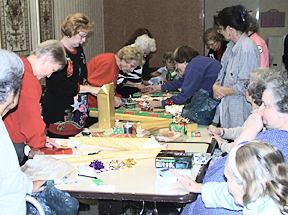Fire-eating evangelist knows how to draw crowds_11204
Posted: 1/09/04
Fire-eating evangelist knows how to draw crowds
By Leann Callaway
Special to the Standard
NASHVILLE, Tenn.–When people say Brad Goad is “on fire for the Lord,” they aren't kidding.
Goad is an evangelist who uses the arts of juggling, mime, comedy and fire-eating to attract audiences so he can present the gospel.
“It is entertainment with a message,” he explained. “There are people who might not listen to a preacher or even musicians, but they will come to see this crazy fire-eating juggler. The juggling, fire-eating, mime and comedy routines are all fun, but seeing how God puts it all together to glorify himself is incredible.”
| Brad Goad: Don't try this at home. |
During his college years at Hardin-Simmons University in Abilene, he was encouraged by the Baptist Student Union director to use his juggling talents as a creative way to share the gospel.
“I won a talent show at Hardin-Simmons, and the BSU director saw me perform,” Goad explained. “Immediately, he asked if I would perform at a fellowship for the BSU, which forced me to do more than just a fun comedy routine. He was also instrumental in getting me other gigs during my college years in area churches, youth groups and other BSU groups in West Texas.”
During this time, he decided to add another element to his routines.
“I was doing some shows with a friend who did illusions and comedy,” he said. “One day, my friend was working on some routines dealing with fire and found a book that showed a picture of a fire-eater. So we decided to teach ourselves how to eat fire in our dorm room. By the way, that's not recommended.
“It honestly took about a year of practice to get good enough and calm enough to perform it in a variety of settings.”
After graduation, Goad worked three years with the North American Mission Board and served as the director of creative arts ministry for the 1988 Winter Olympics in Calgary, Alberta.
“It was so much fun using all these gifts that began as hobbies and seeing how God continued to open doors of opportunity to minister to people,” he said. “Since there were people all over the world gathered in one place, it was a great opportunity to share Christ.
“People may not realize that in the host city of the Olympics, there are preliminary competitions and events for several months prior to the actual Olympics–so there were multiple opportunities to use this creative ministry and develop routines. One mime routine I did was called 'The Altar,' which was about giving your whole heart to God and how he gives you a brand-new life through Jesus Christ.”
In 1993, Goad moved to Nashville, Tenn. to begin working with LifeWay Christian Resources. Within a few years, he was in charge of the adult discipleship training and enrichment sections for their curriculum.
“Through this, I was able to help people maximize their gifts in a specific area of ministry,” he explained. “This was the area where Beth Moore Living Proof Live events were birthed. We also broke new ground–combining events with discipleship training for Beth's course 'Jesus the One and Only' in Israel and 'Beloved Disciple' in Greece and Turkey. It was an incredibly exciting ministry.”
But in 2002, Goad felt God leading him back to full-time service through creative evangelism.
Now he shares his innovative ministry with all ages at church outreach events, Upward Basketball banquets and other events across the country.
“I especially enjoy performing for college groups,” he said. “That age group has always been special to me because my own spiritual growth during that time was so significant. It was during those years that God prepared me for what I am doing now, in ways that I couldn't even appreciate back then.”
